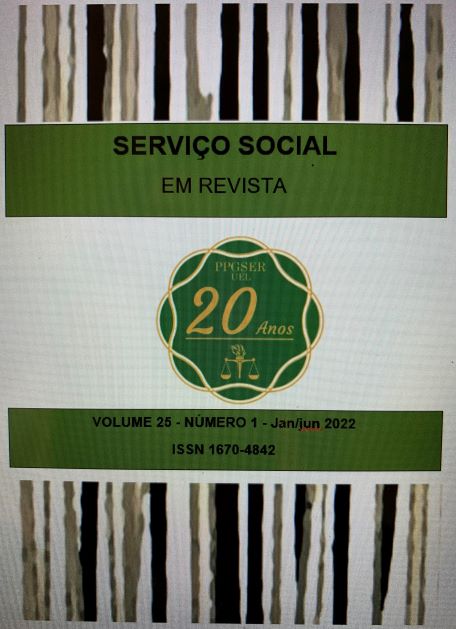The internship in Social Work and its contribution to the production of knowledge in training and professional work
DOI:
https://doi.org/10.5433/1679-4842.2022v25n1p29Keywords:
internship, social service, knowledge productionAbstract
This article discusses the internship in Social Work and its contribution to the production of knowledge in professional training and work. This debate is necessary in view of the advance of critical knowledge produced by Social Work, in which the internship is an area of knowledge that has rele-vance in its critical-analytical contribution to the investigative process, from training to professional practice. Research was carried out in the fields of internship and documentary survey, from 2011 to 2019, in the Social Service course of the Institute of Social Sciences, Education and Zootechnics of the Federal University of Amazonas, in the municipality of Parintins/Am. The research revealed that the internship fields have provided the production of Course Completion Works resulting from the experi-ences of the mandatory curricular internship, as well as the internship has been the subject of produc-tions of the Institutional Program of Scientific Initiation Scholarships (PIBIC). It is concluded that the praxis in the internship brings the interns closer to the interventional character of the profession, but it is necessary to stimulate the investigative dimension, as well as to broaden the discussion about the theme 'internship', since the internship fields become the main locus for the production of critical knowledge of reality.Downloads
References
ASSOCIAÇÃO BRASILEIRA DE ENSINO E PESQUISA EM SERVIÇO SOCIAL - ABEPSS. Política Na-cional de Estágio da Associação Brasileira de Ensino e Pesquisa em Serviço Social. Brasília, DF: 2010. Disponível em: http://www.cfess.org.br/ arquivos/ pnea-bepss_maio2010_corrigida.pdf. Acesso em: 21 fev. 2022.
ASSIS, R. L. M; ROSADO, I. V. M. A unidade teoria-prática e o papel da supervisão de estágio nessa construção. In: Revista Katálysis, [S. l.], v. 15, nº 2, p. 203-211, 2012.
BRASIL. Lei nº 11.788, de 25 de setembro de 2008. Dispõe sobre o estágio de estudantes e dá outras providências. Brasília: Presidência da República. Disponível em: http:// www.planalto.gov.br/ccivil_03/_ato2007-2010/2008/ lei/l11788.htm. Acesso em: 21 fev. 2022.
BRASIL. Lei nº 8.662, de 7 de Junho de 1993. Dispõe sobre a profissão de Assistente Social e dá outras providências. Brasília: Presidência da República. Acesso: em 21 fev. 2022. Disponí-vel em: http://www.planalto.gov.br/ccivil_03/leis/l8662.htm. Acesso em: 21 fev. 2022.
BRASIL. Parecer CNE/CES 492/2001. Ministério da Educação. Conselho Nacional de Educa-ção. Brasília. Disponível em: http://portal.mec.gov.br /cne/arquivos/pdf/ CES0492.pdf. Acesso em: 21 fev. 2022.
BURIOLLA, M. A. F. Supervisão em Serviço Social: o supervisor, sua relação e seus papéis. São Paulo: Cortez, 2011.
CAPUTI, L. Supervisão de estágio em Serviço Social: significâncias e significados. In: R. Katál. Florianópolis, v. 19, nº 3, p. 389-394, out./dez. 2016. Disponível em: https:// periodi-cos.ufsc.br/index.php/katalysis/article/download/1414-49802016.003.0000 9/33238/161736. Acesso em: 21 fev.2022
CONSELHO FEDERAL DE SERVIÇO SOCIAL - CFESS. Cartilha Estágio Supervisionado: Meia Formação não garante um direito. Brasília. CFESS: 2013. Disponível em: http:// www.cfess.org.br/arquivos/Brochura CFESS_Estágio-Supervisionado.pdf. Acesso em: 21 fev. 2022.
CONSELHO FEDERAL DE SERVIÇO SOCIAL - CFESS. Resolução CFESS nº 533 de 29 de setem-bro de 2008. Ementa: Regulamenta a Supervisão direta de estágio no Serviço Social. 2008. Disponível em: http://www.cfess. org.br/arquivos/Resolução 533.pdf. Acesso em: 21 fev. 2022.
CONSELHO FEDERAL DE SERVIÇO SOCIAL - CFESS. Lei Nº 8.662 de 13 de março de 1993. Dis-põe sobre o Código de Ética do/a assistente social e de regulamentação da profissão. 10.ed. Brasília, 2012. Disponível em: http://www.cfess.org.br/arquivos/ CEPCFESS-SITE.pdf. Acesso em: 21 fev. 2022.
FORTI, V; GUERRA, Y. Na prática a teoria é outra? In: Serviço Social: temas, textos e contex-tos. Rio de Janeiro: Lumen Juris, 2010.
IAMAMOTO, M. V. O Serviço Social na contemporaneidade: trabalho e formação profissio-nal. São Paulo: Cortez, 2005.
MARX, K. O capital: crítica da economia política: Livro I: o processo de produção do capital. Tradução de Rubens Enderle: São Paulo: Boitempo, 2013.
ORTIZ, F. G. Desafios Contemporâneo para o Processo de Estágio e Supervisão em Serviço Social. In: FORTI, V.; GUERRA, Y. (Orgs.) Serviço Social: Temas, Textos e Contextos. Coletânea Nova de Serviço Social. Rio de Janeiro: Lumen Júris Editora, 2010.
PAULO NETTO, J. Introdução método na teoria social. In: CFESS. Serviço Social: direitos soci-ais e competências profissionais - Brasília: CFESS/ABEPSS, 2009.
SANTOS, C. M. Na prática a teoria é outra? mitos e dilemas na relação entre teoria, prática, instrumentos e técnicas no Serviço Social. Rio de Janeiro: Lumem Juris, 2013.
TONET, I. Método Científico: uma abordagem ontológica. Maceió: Coletivo Veredas, 2018.
UNIVERSIDADE FEDERAL DO AMAZONAS - UFAM/ Instituto de Ciências Sociais, Educação e Zootecnia - ICSEZ Parintins. Projeto Político Pedagógico do Curso de Serviço Social - PPC, 2012. Disponível em: https://icsez.ufam.edu.br/cursos-de-graduacao/servico-social.html. Acesso em: 21 fev.2022.
VASCONCELOS, I. Dilemas e Desafios do Estágio Curricular em Serviço Social. In: Revista da ABEPSS, Ano IX, nº. 17, 2009.
Downloads
Published
How to Cite
Issue
Section
License
Copyright (c) 2022 Serviço Social em Revista

This work is licensed under a Creative Commons Attribution-NonCommercial-NoDerivatives 4.0 International License.
A revista se reserva o direito de efetuar, nos originais, alterações de ordem normativa, ortográfica e gramatical, com vistas a manter o padrão culto da língua e a credibilidade do veículo. Respeitará, no entanto, o estilo de escrever dos autores. Alterações, correções ou sugestões de ordem conceitual serão encaminhadas aos autores, quando necessário. Nesses casos, os artigos, depois de adequados, deverão ser submetidos a nova apreciação. As provas finais não serão encaminhadas aos autores. Os trabalhos publicados passam a ser propriedade da revista Serviço Social em Revista, ficando sua reimpressão total ou parcial sujeita a autorização expressa da revista. Em todas as citações posteriores, deverá ser consignada a fonte original de publicação, no caso a Serviço Social em Revista. As opiniões emitidas pelos autores dos artigos são de sua exclusiva responsabilidade.














